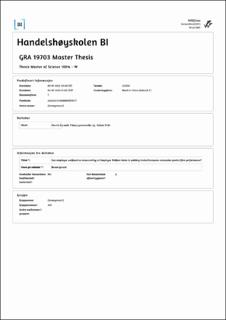| dc.description.abstract | This paper investigates the predictive power of a constructed Employee Welfare
Index (EWI) and Workforce Index (WFI) on firm performance for European firms, measured as forward stock returns and Tobin’s Q. To address reverse causality; we measure firm performance by using forward stock returns and lagged EWI for Tobin’s Q, controlling for risk, firm characteristics, and sectors. We find a positive and weak association between the changes in EWI and longer-term forward returns. However, this connection is not as robust as in comparable US studies. Interestingly, in our market-based performance models,the impact of EWI on Tobin’s Q is negative and highly significant. While this finding is surprising, this could be explained by the rigid labor market landscape in Europe, marked by
stringent regulations, social protections, and a more centralized approach to wage-setting. | en_US |
